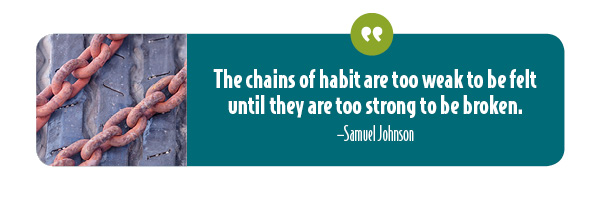Habits control our lives whether we recognize it or not. If you’ve ever tried to overcome a bad habit, you’ll relate to the power of habits.
From the moment you get up in the morning, your activities are on cruise control: brushing your teeth, showering, eating breakfast, exercising (or not), checking Facebook or your email inbox, rituals once you’re at work, etc. Whatever you repeat enough and do routinely, the brain will create a habit. Why? Because the brain is a superhighway of efficiency.
Estimated reading: 4 minutes

Our Brains and Unconscious Habits
Ponder for a moment how magnificent your brain is. Your unconscious mind orchestrates trillions of activities in your body continually: blood flow, digestion, water absorption, cell production, breathing, etc. You don’t even have to think about any of these vital tasks because they are done unconsciously just like habits.
In a nutshell, that’s why the brain creates automation: for speed, ease, and efficiency. Whenever you repeat an activity, for instance, like driving, the sequence of tasks once learned and mastered are delegated to the more effective powerhouse of the unconscious. And that’s why habits can be so hard to break. They’re no longer conscious!
Why not create healthy and life-inspiring habits to have the speed and agility of your brain’s unconscious powerhouse?
There are many kinds of habits. Let’s break them into categories so you can begin to understand just how powerful they are. And this will also give you a starting place for any change you’d like to make.
How Mental Habits Help Shape Your Outcomes
With an estimated 60-70,000 thoughts a day, your thoughts create the foundation for your perspective, attitude, and emotional well-being. The majority of what you think about daily can become automatic unless you assert mindfulness. You have a choice of how to frame each experience and the circumstances of your life.
Do you complain a lot or are you generally positive? Depending on how you answered, your thoughts might be negative, positive, or a combination of both.
Some possible negative thoughts might sound like this:
“What a dreary day.”
“I can’t believe how slow that clerk was at the grocery store!”
“There’s never enough money to make it through the month.”
“I hate my work.”
“How could I be so stupid?”
 Using the same situations from a new perspective, some positive thoughts through the eyes of appreciation could sound like this:
Using the same situations from a new perspective, some positive thoughts through the eyes of appreciation could sound like this:
“I’m so glad it’s raining; we need the moisture.”
“The clerk was kind to take time for talking with me at the check-out.”
“We need to look at our spending and focus on saving and earning more.”
“I work with such great people, and I’m ready for a change.”
“It was fun learning today. I made some mistakes, but I’ll catch on.”
Increased awareness of your thinking habits is the beginning of any change. Practicing mindfulness is a great place to start if you want to create change in your life.
Related reading: "5 Ways Brain Fitness and Behavioral Health Are Optimized by Healthy Habits."
Emotional Habits Fuel Your Experiences
How you regulate and express your emotions (or repress them) will determine how much energy you have; how happy you feel every day; and the quality of your relationship with yourself and others.
 Emotions are energy moving through us. Each person experiences them differently. When we have an experience, the mindset through which we view the experience will significantly influence how we feel. In the examples of possible thoughts above, you can see that it is not the weather or the clerk at the grocery store or the amount of money that we make which decreases or increases our happiness.
Emotions are energy moving through us. Each person experiences them differently. When we have an experience, the mindset through which we view the experience will significantly influence how we feel. In the examples of possible thoughts above, you can see that it is not the weather or the clerk at the grocery store or the amount of money that we make which decreases or increases our happiness.
Our perspective determines how we feel about our lives and experiences.
Related reading: 5 Steps to Reset Your Emotions and Find Inner Peace
Lifestyle Habits Determine Your Health
Most people can connect the dots of their behaviors and how they add up to equal their life habits and the quality of their life. If a person overeats and eats unhealthy food regularly, weight gain is inevitable. With a lack of exercise, a person gets out of shape. If a person consumes lots of sugar and doesn’t brush their teeth, cavities are a probability.
Life habits are the accumulation of dozens of decisions made every day. Unless you are attentive to the quality of your life and taking actions that support your healthy, goals, and values, it’s easy to get off track. Before you know it, a bad habit can take over and sneak into automation!
If one overspends and lives outside their means, debt is likely, and so on.
It's time to pick just one area to focus on to develop healthier habits. An excellent way to choose is by either selecting a small habit that would be easy to retrain or a pattern that if you changed for the better would dramatically improve the quality of your life and work.
You get to choose. Every day you decide how you’re going to show up for your life.
As Gandhi once said: “Action expresses priorities.”
What will you make a priority in your life?
What will you do today that will determine a brighter tomorrow? What action, no matter how small, will increase the quality of your life in the long term? And what interaction with your partner or child could be more loving and patient? Pick one new habit you’d like to develop and start today.
For additional support and keys to changing habits for the better, see our other blogs on the topic!
- One Habit Can Transform Your Life
- 8 Keys for Breaking Bad Habits
- How to Build Healthy Brain Habits This Spring
- Building Healthy Brain Habits: Dream Big, Start Small
- How to Change Habits and Create a Life You Love
If you'd like to learn more about emotional intelligence, need parenting support, or want personalized support to create a thriving life, contact us today.








